2006 U.S.-Korea Yearbook
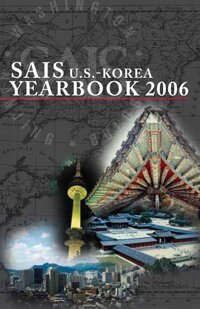 As part of the new Korea program at SAIS, a course was also introduced for the fall semester 2006: “The Two Koreas: Contemporary Research and Record.” SAIS students researched current issues in U.S. relations with North and South Korea under the direction of David Straub, a former director of Korean affairs at the State Department. In addition to conducting numerous interviews of U.S. government officials and other experts on U.S.-Korean relations in Washington, D.C., the students traveled as a group to Seoul to receive briefings from and conduct interviews with Korean government officials, scholars, and politicians. This inaugural edition of the U.S.-Korea Yearbook, covering the chief security, economic, and cultural issues in relations between the U.S. and the two Koreas in calendar year 2006, is the product of their research.
As part of the new Korea program at SAIS, a course was also introduced for the fall semester 2006: “The Two Koreas: Contemporary Research and Record.” SAIS students researched current issues in U.S. relations with North and South Korea under the direction of David Straub, a former director of Korean affairs at the State Department. In addition to conducting numerous interviews of U.S. government officials and other experts on U.S.-Korean relations in Washington, D.C., the students traveled as a group to Seoul to receive briefings from and conduct interviews with Korean government officials, scholars, and politicians. This inaugural edition of the U.S.-Korea Yearbook, covering the chief security, economic, and cultural issues in relations between the U.S. and the two Koreas in calendar year 2006, is the product of their research.
Download the full 2006 U.S.-Korea Yearbook
All SAIS U.S.-Korea YearbooksU.S.-Korea Yearbook Table of Contents
Acknowledgements and Forwards
Acknowledgements by Don Oberdorfer, Chairman, U.S.–Korea Institute at SAIS
Forward, by Alexander Vershbow, U.S. Ambassador to the Republic of Korea
Forward, by Lee Tae Shik, Republic of Korea Ambassador to the United States
Introduction, by Professorial Lecturer David Straub
Part One: U.S.-ROK Relations
Overview of ROK-U.S. Relations in 2006: A Time of Transition, by Manhee Lee
Manhee is a South Korean diplomat
USFK Realignment and Reduction, by Nina Sawyer
Nina formerly served in the U.S. Airforce in South Korea
Wartime Operation Control, by Kate Ousley
Kate has worked for the U.S. Senate and studied in Asia
The Status of Forces Agreement, by Junghwa Lynn Pyo
Junghwa Lynn is a South Korean diplomat
South Korea — U.S. Economic Relations and Bilateral Free Trade Negotiations, by Junko Saito
Junko is an official of the Japanese ministry of Economy, Trade, and Industry
Korean Political Culture and U.S.—Korean Relations, by Eun–ha Kim
Eun–ha is a Georgetown University graduate with experience working at major foreign policy think tanks in both Seoul and Washington D.C.
South Korean Cultural and Social Trends, by Zhang Lu
Zhang is a People’s Republic of China diplomat
Part Two: U.S.—DPRK Relations
Overview: North Korean Nuclear Crisis, by Viktoriya Kim
Viktoriya is formerly an official of the Uzbek Ministry for Foreign Economic Relations, Investments, and Trade
Six–Party Talks: The Other Four, by Seoung Mo Kang
Seoung Mo served in the South Korean military
Human Rights in the DPRK: Ongoing Abuses, Conflicting International Policies, by Kaitlin Bonenberger
Kaitlin has worked in Seoul for a South Korean organization promoting human rights and democracy in the North
UN Nuclear and Missle Sanctions and North Korean Illicit Activities, by Melanie Mickelson Graham
Melanie has worked at both the U.S. Senate and Department of Defense
Part Three: Korea in the Region
The Korean Peninsula and Japan, by Doo Shik Shin
Doo Shik, a South Korean citizen, lived in Japan for over 20 years and worked for the Japanese conglomerate Itochu Corporation in Tokyo
Sino—Korean Relations, by Limin Liang
Limin has worked in the U.S., China, and Japan
Photographs from the students’ research in Seoul, South Korea
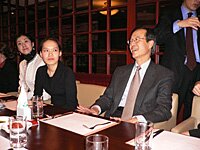
Former Foreign Minister Han Sung Joo (1993–94) with students
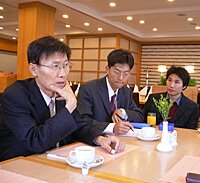
Former Foreign Minister Yoon Yong Kwan (far left, 2003–04) with students
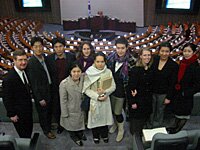
Professor Straub and students while touring the National Assembly of the Republic of Korea
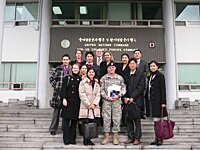
The students in front of the UN Combined Forces Command offices



